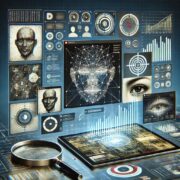AI tends to take the headlines once in a while, but people don’t always talk much about what it is. But it is definitely a revolutionary technology.
Technology is evolving ever more quickly.
As things speed up and get much better and more efficient, some new terms also appear, and they can be weird and confusing.
See, for example, “machine learning”, “cloud computing”, and “cybernetics”, among others.
The term AI (short for Artificial Intelligence) has been around for a while, but if you’re not much into technology, computer science, or science-fiction, you may not see it around often.
As it has become a common acronym in fields that deal with technology and computing, people often don’t bother to explain it too.
So, in this article, we’ll explain the basics of artificial intelligence and what it’s used for today.
What is artificial intelligence?
Artificial intelligence is the name given to computer programs that try to mimic one or more traits of human intelligence.
Among those traits we have:
- Solving problems;
- Reasoning;
- Learning;
- Recognizing objects, people, and patterns;
- Understanding languages;
- Among many others.
While we currently don’t have many examples of AIs that can do all or most of them, there are a lot of very good AIs out there that can do at least one of those.
While in theory we could just put all of those specialized AIs together and create a complete one, the main problem isn’t just connecting them, it’s the processing power required.
The best AIs we have currently run on very powerful computers or have entire server farms dedicated to them.
So fully functioning artificial human intelligence is still a bit far away.
Where did it come from?
Artificial intelligent beings have existed in our cultures long before AIs became a thing in technology.
In Greek mythology, the god of blacksmithing Hephaestus had fashioned a man made of bronze, called Talos, who was the protector of the island of Crete.
In China, a text tells the story of Yan Shi, an inventor who presented the king with an automaton that was indistinguishable from a human being, and that could sing perfectly.
Today we mostly associate AI with robots, thanks to the works of science-fiction writer Isaac Asimov, in the 40s and 50s.
Asimov pioneered the idea of “robots” as mechanical beings that had a human-like form and human-like (or superior) intelligence, thanks to their “positronic brain”.
His works also created the idea of the “Three Laws of Robotics” and discussed the relationship between humans and robots.
Artificial intelligence would only start to be seriously considered in science in the 40s, thanks to the works of Alan Turing, who also pioneered computer science as we know it today.
He figured that a computer could likely be able to imitate a human being, and came up with what we now call the “Turing Test”: a test to determine whether an AI could fool a person into thinking it’s human.
The Dartmouth Conference in 1956 then premiered the first attempts at AIs: some researchers were working on creating one that could play chess, others were working on some that could solve mathematical problems, among others.
Things took a leap with the creation of the Perceptron.
Psychologist Frank Rosenblatt first created the concept of a “neural network”, an artificial simulation of the way the human brain works.
He then applied it to try to create an AI that could recognize patterns in images by “training” the machine: he would put multiple images and define what was correct for each of them.
So, when it received an image without knowing what was correct, it could be able to guess based on what it learned.
That was the embryo of machine learning (ML), one of the most important AI technologies today.
Why is AI important?
Artificial intelligence has the power to make our lives much easier and simpler.
AI is the next step of automation, but instead of just automating repetitive movements, like industrial robots do, it can automate:
- Pattern detection, for example in quality control processes;
- Decision-making, being able to account for huge amounts of data very quickly;
- Clerical tasks, such as transcribing and filling forms;
- Among many other similar tasks.
While we are still very far away from letting AIs making decisions for us, in their current state they are already a very helpful tool in our daily lives.
And we barely notice them.
How can I use an AI?
That depends on what you mean by “use an AI”.
If you want to let artificial intelligence make your life easier, you are probably doing that already.
Amazon, Facebook, Google, Spotify, and Netflix, among many other services, already use machine learning to make their suggestions to you.
These recommendation systems use machine learning to figure out patterns in user behavior, namely associating some products with others based on how many people like them.
That way, it figures that, if you like some of those products, you may like the others too.
If you use those services and check out those recommendations, then you probably already noticed that they aren’t perfect. Sometimes they come up with some strange suggestions.
That’s normal, those AIs are still being developed and calibrated, and there are way more products around than users that like them, so that may skew the results.
Now, if you want to make your own AI, that can be a bit more complicated.
If you want to make one from scratch, you need to know programming and get some textbooks.
It doesn’t need to be an ML AI, though. You can create “decision trees” like video game AIs do, which work for simpler applications, but take a while to make and test.
If you want to play around with machine learning, you’ll need to know some programming too, but you also need to have a good computer, and some spare time.
The term “machine learning” means that the machine learns, that is, you have to teach it what you want it to do (which in computer science is called “training”). And that can take some time.
Artificial intelligence is an amazing technology that is pretty much still in its infancy, but is already improving our lives and it’s getting better everyday.
What else do you think that it’s going to improve?







Comments